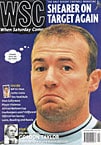 A new type of football violence is emerging in the Italian capital, says Roberto Gotta
A new type of football violence is emerging in the Italian capital, says Roberto Gotta
Italy has again been surprised by an outbreak of football violence, and moved swiftly, though as usual too late, to correct it. It wasn’t the usual city centre skirmishes but a different kind of violence: political slogans written on large banners and racist chants, a disease which had been spreading for a long time without anyone noticing.
The biggest furore was caused by a giant Lazio fans’ banner honouring the late “Tiger” Arkan, a notorious Serb war criminal and owner of the Belgrade club Obilic. That banner was surrounded by a few others displaying right-wing slogans and symbols, which is not unusual among Lazio fans who have long had a reputation for right-wing activism. But this was obviously too much for the government, which promptly held a summit with home secretary Enzo Bianco, representatives from the Sports Ministry and the FIGC (the Italian football association), and the police. It was decided that from now on no offensive banners would be tolerated inside sporting venues, and that matches should be held up until any such banners were removed.
How those banners – which had been declared illegal five years ago after some AC Milan fans killed a rival supporter in Genoa – had been smuggled into the Stadio Olimpico no one knew, until one of the Lazio fans involved revealed that each letter had been brought in, wrapped up in newspaper, by individual fans.
Political activists of right and left have been going about their business in Rome for a few years. Two years ago, before a derby against Roma, Lazio fans displayed a banner reading “Auschwitz is your country, crematoria your home” and swastikas had been appearing regularly among the Curva Nord (North End) fans, along with more humorous ones (“Ejacu-Lazio”, said one). The authorities had become a little restless after some Roma fans, traditionally left-wing, also displayed fascist symbols before a derby last year.
But worse was to follow for those who feared that the Arkan demonstration and the subsequent laws would trigger something else. Fans generally behaved on the first Sunday when political or offensive banners were to be confiscated and games stopped, while some fan groups resorted to humour (one Torino banner honoured Sylvester the cat). Lazio fans, however, incessantly barracked Parma’s black players, Lassissi and Thuram, while Roma fans were giving the same treatment to another black player, Perugia winger Ibrahim Ba.
The verbal abuse spawned more alarmed reactions in government and football circles. Again, it seemed people had short memories: hadn’t Udinese given up trying to sign Ronnie Rosenthal a few years ago, a few days after finding the walls outside the club offices painted with slogans insulting Rosenthal for being Jewish; and hadn’t some Inter fans daubed slogans objecting to the signing of Paul Ince?
No new measures have been taken to curb verbal and racist abuse, and most people have adopted a wait-and-see attitude.The fear is the laws against offensive banners will be reinforced for a while, before disappearing into oblivion like most laws here.
Meanwhile, the signs are that Lazio officials might do something to cut down on their fans’ horrific behaviour, though one suspects that owner Sergio Cragnotti’s words of condemnation (“We could do without fans like those, their slogans were disgusting”) reflect more a concern for Lazio’s well-being in the stock market than a genuine disgust. This is Cragnotti’s big chance to show he cares not only about winning trophies – which Lazio might not do anyway since they always seem to fall apart late in the season – but also about creating a model fan base. It’s going to be much more difficult than anybody would have thought.
From WSC 158 April 2000. What was happening this month